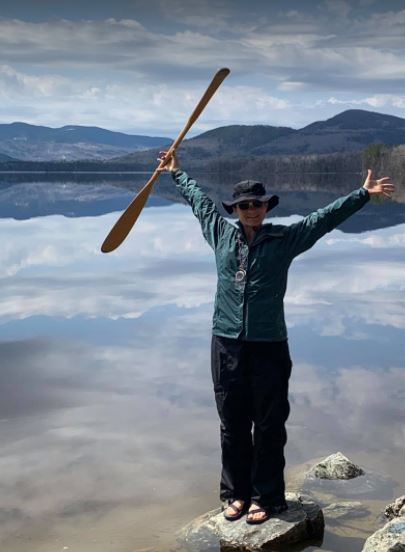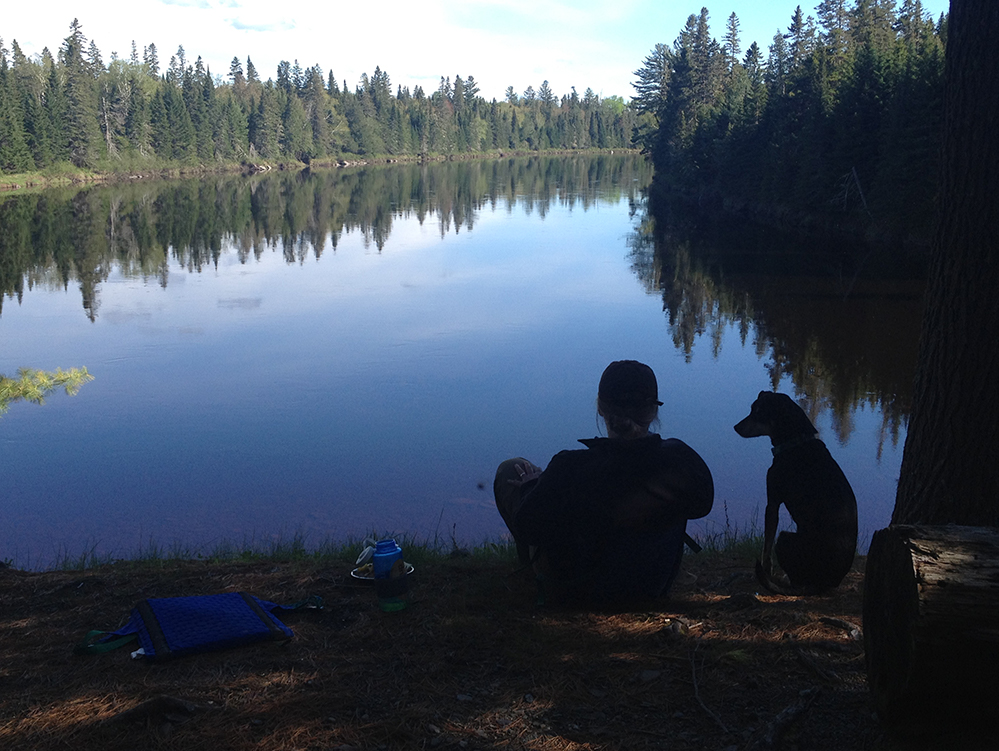Interview with Michelle Moschkau, MSW Student & Scholarship Recipient
Meet Michelle Moschkau, UMaine Master of Social Work student. Moschkau is also a member of the UMaine Professional Opioid Workforce Response Program (POWR). Receiving an academic scholarship enabled Moschkau to focus on her course work and clinical field placement and increase her awareness around the relationship between substance abuse disorder and trauma, furthering her resolve to be part of the solution.
Where do you work and what do you do?
I recently transitioned from my job to begin my full-time Master of Social Work clinical field placement this summer. Prior to this, I worked for the Family Violence Project, the Domestic Violence Resource Center for Kennebec and Somerset Counties as a shelter advocate. I supported people fleeing domestic violence in the Somerset County shelter who are also struggling with substance use disorder. The incredible team assists with safety planning, acquiring resources, and building a new life after abuse. They also have a grant that connects shelter residents to treatment for substance use disorder so they can get the recovery support they need.
What program did you participate in?
I’m in the UMaine hybrid Master of Social Work program. It is a three-year, 63 credit program and I am close to completing my third year. This summer is my final semester, and I will be doing my clinical placement (500 hours) at a counseling center called Higher Ground in Brewer. I did my generalist practice with the Maine Chapter of the National Association of Social Work. I also was a fortunate member of the UMaine POWR (Professional Opioid Workforce Response) program. I am incredibly grateful for the many Hutchinson Center scholarships I have received throughout my program.
Of all the things you learned during the program, what stuck with you the most?

In my work, I have seen how the trauma of domestic violence and abuse can lead to survivors describing they feel completely disconnected from their bodies. Many survivors in shelters grew up experiencing many of the ACEs (Adverse Childhood Experiences). As we know from the ACEs study, trauma not only hurts the mind and psyche, but contributes to diseases of the body, like heart disease, cancer, and liver disease.
As a person who feels most at home in my body and in movement practices like yoga, I am especially interested in the role of the body in healing trauma. I want to find ways to help others feel at home in their bodies, too. In our research class, we had the fun of doing a deep dive into the topic of our choosing.
For my project, my research partner and I interviewed yoga teachers and mental health clinicians who used body-based healing modalities for trauma. We also met regularly with our professor, Dr. Elizabeth DePoy, who encouraged us, challenged us, and read alongside us. I am forever grateful for this project. Not only did I fill my journal with ideas for incorporating practices into my work with clients, but I also developed an appreciation for research.
Usually, I am much more of a “mover” than a “sit-still-and-read” kind of person so I always approached reading heady research articles as a chore. Through this project, I began to see research as a way of communicating knowledge. As I read and wrote I began to understand what it would feel like to be “in conversation” with these people who so passionately shared their findings with the academic community. I have always envisioned myself in a future of working with people, teaching yoga, and doing things. But now I feel that reading research truly is a new habit that will stick. To me, my new “habit” feels like I am really carrying my academic experience into the rest of my life. I will base my future professional choices on what I learn in the research, and that’s empowering.
How has participating in this program impacted you?
On the exact day I planned to mail in my Professional Opioid Workforce Response Program (POWR) program acceptance paperwork, I learned that a person I cared about very much had died of an opioid overdose. I actually put my paperwork in the mail questioning whether I would be able to handle the ongoing heartbreak of continuing this work. He had a really tough life and was so incredibly resilient. I wanted to see him overcome his trauma and live a happy life.
Later in a class with Loren Andrews, we examined the neurobiology of trauma and toxic stress and effective clinical counseling modalities. Shortly after we learned how toxic stress can enlarge the amygdala and shrink the hippocampus, I met with a client who felt a lot of shame for experiencing debilitating anxiety and struggling with substance use disorder. She was interested in how the brain works and loved hearing what I had learned in class. She said to me, “It’s so helpful to know that my overwhelming feelings are not my fault.” She had lived through some unthinkable traumas, and learning about the brain helped increase her self-compassion and feelings of empowerment. We also used that conversation as a jumping-off point for trying different strategies for helping her feel grounded. She especially loved guided body scan meditations, and at her request, we did them together before starting each meeting.
The more I learn about trauma, the more I feel equipped to help heal it. In the end, I have decided that the heartbreak is why I will do this work. The more I learn about substance use disorder and understand its relationship to trauma, the more I am inspired to be a part of the solution.
Do you have any advice for people who are thinking about taking a course or a professional development program at the Hutchinson Center?
The MSW program is more than just the classes, it’s a connection to a learning community. You will be connected to a lot of bright classmates with rich life and professional experiences. Professors can be such great resources, and any time someone offers to meet for coffee (in person or on zoom, of course) take them up on the offer!
I would also say that the three-year hybrid program social work program is designed for working people and people with families. Professors understand that an essential part of being a good social worker is to have excellent self-care. My advice is the same as theirs: always put your family and self-care first. It is a lot of work, but you can do it!
How did receiving a scholarship affect your ability to participate fully in this program?
The Hutchinson Center scholarship program is wonderful! Receiving a scholarship enabled me to let go of some of my extra jobs so I could focus more on school. The scholarships gave me and my family significant relief from trying to figure out how to juggle the cost of tuition on top of everything else. I am so thankful.

